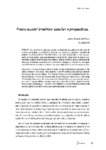Mostrar o rexistro simple do ítem
Ensino escolar brasileiro: desafíos e perspectivas
| dc.contributor.author | Jamil Cury, Carlos Roberto | |
| dc.date.accessioned | 2011-07-12T11:34:19Z | |
| dc.date.available | 2011-07-12T11:34:19Z | |
| dc.date.issued | 2001 | |
| dc.identifier.citation | Sarmiento Anuario galego de historia da educación, 2001, 5: 65-75. ISSN: 1138-5863 | es_ES |
| dc.identifier.issn | 1138-5863 | |
| dc.identifier.uri | http://hdl.handle.net/2183/7758 | |
| dc.description.abstract | [Abstract] The ways leading to education in the schools 01 Brazil are the expression 01 500 years 01 exclusion. Even today, these ways are mixed with demands, proposals and attempls that will open the doors to inclusion. The Federal Constitution 01 1988 broadened the defínition 01 citizenship both in terms 01 the incorporation 01 new rights as well as covering a wider range of inhabitants. Nonetheless, the challenges persist. Although they may have changed in degree or in conten!, they are still there, because lhe class society in Brazil makes it almost impossible to include the underprivileged. The bottom line is that this is a country that ranks ninth in world economy, but with one 01 the mos! unjust income distributions on the planet. | es_ES |
| dc.language.iso | glg | es_ES |
| dc.publisher | Universidade da Coruña | es_ES |
| dc.title | Ensino escolar brasileiro: desafíos e perspectivas | es_ES |
| dc.type | info:eu-repo/semantics/article | es_ES |
| dc.rights.access | info:eu-repo/semantics/openAccess |






